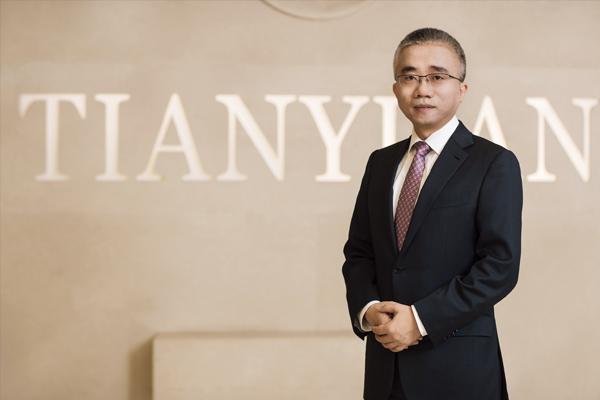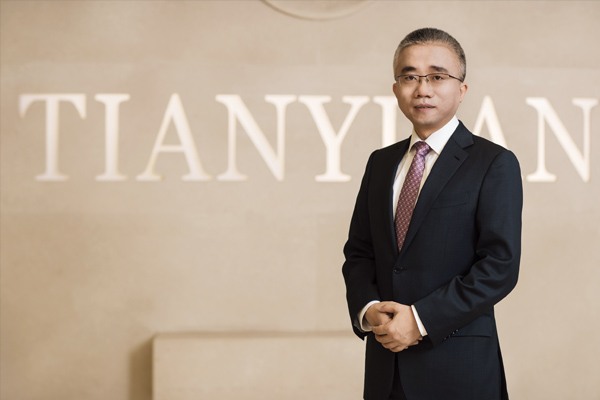
CLB: How would you describe Tian Yuan Law Firm in the past one year?
Zhu: Sustainable and rapid growth I would say. Last year, we completed the IPO and maintained our leading position in the industry. We had significant growth in core business areas such as mergers and acquisitions (M&A), dispute resolution, antitrust and financial and asset management.
We established a branch in Hong Kong, which marked a new journey for us, as this is our fourth branch as well as the first one outside Mainland China.
Many of our current clients have been listed on the Hong Kong Stock Exchange. Launching a branch in Hong Kong and working with the local firms there enables us to better understand local regulations and do a better job in helping our clients with compliance work.
The expansion also fits our strategy in the equity market. Cross-border M&A and investment will still be the main area among Chinese investors in the next couple of years and an office in Hong Kong would put us in a better position to deal with the transactions.
Our Shenzhen branch has also been rapidly developing. Both the number of staff and revenue have doubled compared to when it was first launched.
CLB: Currently Tian Yuan has three offices in Mainland China and one in Hong Kong. It seems that Tian Yuan chose a different development path instead of fast expansion. What is your consideration?
Zhu: You are correct. Our theory is that we do not expand just for expansion. We are very cautious in terms of setting up new branches.
We only opened our first branch in Shanghai in 1999, seven years after Tian Yuan was established as we had solid experience and were ready to explore more opportunities and equity markets.
Since then, we have focused on the clients and business in Beijing and Shanghai. And only in 2012, when we saw policy reforms and quick development in other regions, we set up our Shenzhen office and Chengdu office.
It is not that we were not able to establish one or two more offices within those 13 years, but that we have always placed quality above quantity.
One common expansion strategy that we now see in China is the acquiring of local law firms. Under the deal, they share the larger law firm’s brand but operate independently with their original system. Many local firms have come to us in the past as well, but we did not accept any such offers. It is not that any one approach is better, but that we believe a standardized structure is more suitable for Tian Yuan’s operation.
CLB: What is Tian Yuan’s structure and how would you describe Tian Yuan’s culture?
Zhu: If we depicted the firm as a person, I would say that Tian Yuan is a modest, determined, persistent and scrupulous gentleman.
While actively looking for new opportunities and clients, we strived to improve and perfect our professional skills in what we are doing to serve our current clients.
A firm’s service quality and professional capability can be observed from its client portfolio and their trust in the firm. Many of our clients have been working with us for more than 20 years. They include outstanding state-owned enterprises such as China Resources and Sinochem Group, as well as leading private companies in different industries, such as Tencent, Wanda, Lenovo and New Oriental.
Also, we see ourselves as an organization that respects freedom. That means our lawyers, from juniors to associates to senior partners, communicate and collaborate in a way that everyone can express their ideas, instead of taking orders in a top–down approach.
CLB: A hierarchy in order of seniority, though, is very common in Chinese companies, which makes learning and upward mobility difficult for young talent. It seems that Tian Yuan has a good approach in recruiting and cultivating young lawyers. Would you like to elaborate on that?
Zhu: There is no glass ceiling in Tian Yuan. Our system encourages lawyers to boost efficiency. Our senior partners are generous in sharing their clients with young lawyers.
Besides routine training for young lawyers joining the firm, we particularly designed a mentor program in which new entrants are assigned one to two partners. The new lawyers can follow their mentor’s clients and participate in ongoing projects. The model is more like a teacher–student relationship rather than boss–subordinate relationship.
And as long as a lawyer is perfectly up to the job, he or she could move upward per our scheme, in which seniority is not a criterion.
CLB: As the managing partner, what do you think are the most difficult and challenging tasks? How would you describe your strategy as managing partner?
Zhu: The most challenging aspects as a managing partner for me are mainly about laying out strategies for the firm as well as time allocation.
The managing partner, unlike other lawyers in the firm, must shoulder the responsibility of fostering a development path for the next five to ten years, including what new industries or practice areas to explore, which kind of structure is more suitable for the firm, and also how to balance the independence of the firm while collaborating on a larger platform, for example in an alliance with an international law firm.
Currently, we are adopting a bi-structural system, a mixture of a corporate structure and partner structure. The way I see it is that eventually, the corporate structure will be more suitable. However, such a structure will impact the existing income allocation, which has been implemented in the firm for more than 20 years. The reform cannot take place immediately.
The second major challenge for a managing partner is more personal; we have to put more effort on management instead of on our own business expansion. Of course, as a lawyer, I still put my current clients’ needs as the priority, but I have to sometimes give up opportunities to get new potential business. For the time being, taking care of the firm’s routine work occupies almost half of my time, and the rest of my time is quite fragmented.
This is why I mentioned that in the future a professional corporate structure is more suitable. For example, having a CEO who focuses on the company’s strategy and routine work would be better. However, bringing in a CEO is still controversial due to the nature of a law firm. Understanding our work requires a high level of professional knowledge.
CLB: What is the outlook for 2017? What are the ingredients to Tian Yuan’s success in the future?
Zhu: The first important thing in 2017 for us is to find suitable local partners in Hong Kong to work with. We believe smaller local ones are more flexible in terms of procedure. We aim to get this done as quickly as possible.
Regarding our existing business, we aim to further clarify our practice areas and get our lawyers to be more professional in one particular area, as we see such demands from our clients. For example, it is not enough to be an expert in M&A. There will be follow-up questions regarding the industry of the M&A. We see that healthcare, education and insurance are some emerging sectors that are crucial in the country, as well as traditional sectors like real estate and infrastructure.



